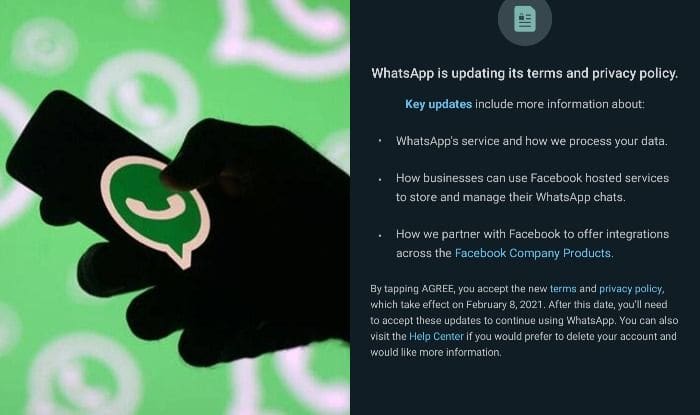WhatsApp has updated its privacy policy, and users have until February 8 to accept the new terms and conditions. The new policy says how user data is impacted when there is interaction with a business on the platform, and provides more details on integration with Facebook, WhatsApp’s parent company.
The privacy policy does not change the way WhatsApp treats personal chats. WhatsApp remains end-to-end encrypted, which means no third party can read them. In a statement, WhatsApp said: “The update does not change WhatsApp’s data-sharing practices with Facebook and does not impact how people communicate privately with friends or family. WhatsApp remains deeply committed to protecting people’s privacy.”
In fact, data exchange with Facebook is already taking place. While users in the European Union can opt out of data-sharing with Facebook, the rest of the world does not have the same choice.
WhatsApp shares the following information with Facebook and its other companies: account registration information (phone number), transaction data (WhatsApp now has payments in India), service-related information, information on how you interact with others (including businesses), mobile device information, and IP address. It is also collecting more information at a device hardware level now. The policy gives reasons for the data-sharing with Facebook: from ensuring better security and fighting spam to improving user experience, which were there in the previous policy as well.
But the new policy is a further sign of WhatsApp’s deeper integration into the Facebook group of companies. Calling the idea “interoperability”, CEO Mark Zuckerberg in 2019 talked about his cross-platform vision across Facebook Messenger, Instagram, and WhatsApp.
Instagram’s Direct Messages and Facebook Messenger have already been integrated. Facebook wants to bring more services to WhatsApp, and has added a feature called Rooms. The integration has been taking place for a while now.
WhatsApp does not show ads yet, and the reported plans appear to have been shelved. If people are worried that personal messages will be used to target Ads on WhatsApp, that would not happen because they are encrypted.
But the increased data sharing with Facebook will be used to improve ad experience across other products of the company.
According to the privacy policy, once a message is delivered, it is “deleted” from the company’s servers. WhatsApp stores a message only when it “cannot be delivered immediately”, the message can then stay on its servers “for up to 30 days” in an encrypted form as WhatsApp continues to try to deliver it. If undelivered even after 30 days, the message is deleted.
The new policy explains how businesses get data when a user interacts with them on the platform. Content shared with a business on WhatsApp will be visible to “several people in that business”. This is important because WhatsApp now has over 50 million business accounts. For WhatsApp, this is a potential monetization model.
The policy says that some “businesses might be working with third-party service providers (which may include Facebook) to help manage their communications with their customers”. To understand how the business is handling the information you share with them, WhatsApp recommends that users read the “business’ privacy policy or contact the business directly”.
A lot of people seem to be switching to Signal from WhatsApp.
Signal is another messaging app, free and end-to-end encrypted, and which has gained a popularity push in light of the new WhatsApp policy. WhatsApp uses Signal’s protocol for its encryption. But Signal is not owned by any corporation, and is run by a nonprofit.





